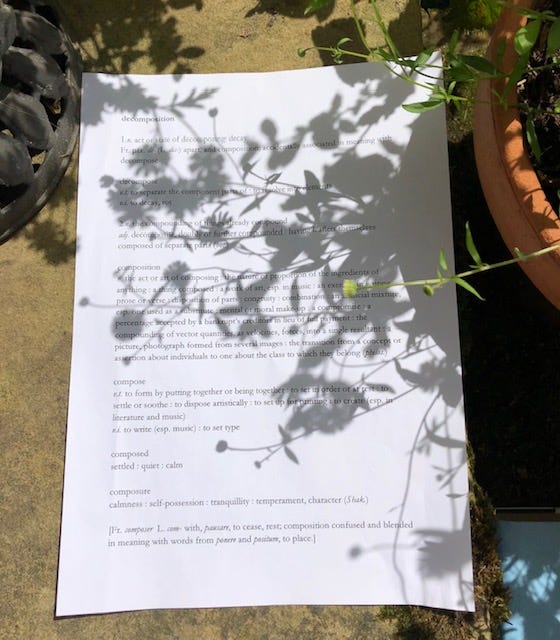I’m sitting on my front doorstep with a pot of chai. It’s only 10 am and the sun is already very warm, less wind than there’s been these past few days. From the trees at the edge of the garden, I can hear a wood pigeon, a chaffinch and, Merlin tells me, a spotted flycatcher. There are certainly lots of flies – outside and indoors. A good year for insects generally, which is heartening.
Last night, driving home late from a friend’s in the never-very-full-dark at this peak of the year, there were more moths than I’ve seen for a very long time, like small scraps of paper swirling in front of my headlights and windscreen – and the dark crescents of bats feasting on whatever winged creature fell prey to their lithe hunting. Enchanted by this nocturnal fantasy, I was glad to have a chance to be part of it, even if encapsulated in metal and glass. Fortunately, I know that short stretch of usually empty road very well, my car practically driving itself home.
In the light of day, the garden too is abundant with life. More birds have joined Merlin’s roll call: goldcrest, crow, goldfinch, blackbird, willow warbler and robin. Hoverflies are grazing the feverfew at the edge of the steps and the climbing hydrangea, which this year has crept round the corner to scale the tall blank outer wall of my study.
I say ‘study’ because I’m not sure what else to call it – office sounds too officious, workspace too business-like, studio a touch pretentious for a writer who wants no pretensions around her work. I am relieved that the damp-proofing and reorganisation of my ground floor that took over a year altogether is now complete and I finally have a room dedicated to writing. But the thing is, now I have one, I don’t seem to actually be able to write (as in WRITE) in it. I answer emails, make lists, plan workshops, host Zoom meetings and write in my journal. The writing of what might become a poem, or even anything but the slightest of Substack posts, doesn’t seem to happen here.
…ring-necked pheasant…coal tit
I have two desks – one old, narrow, pine, drawers stuffed with old drafts, workshop plans and various things I can’t bring myself to throw away but probably should, where the aforementioned tasks take place, and now a huge sloping architect’s desk, passed on to me by a friend. The slope’s supposed to be better for my back and reduce the neck strain I’m often bothered by. Goldilocks-style, I’ve yet to find the just-right chair which will allow me to sit at the foot of this wooden mountain and forget I’m sitting there, which is what I need when I write – to be so totally absorbed in the process of whatever is going on between my imagination and my right hand that no spare energy is wasted on anything extraneous. It’s important too that I don’t pay the price of this absorption with painful tightness in the back of my neck (on the left side) sometime afterwards.
…blue tit…swallow…linnet
Re-visiting Don Paterson’s monumental The Poem – Lyric, Sign, Metre, I’m grateful for his reminder at the outset that writing a poem is an act of composition. He is persuasive in telling us we compose a poem as a composer composes a piece of music or a song. From this angle of approach, it’s clear it requires concentration, technique, precision, an aesthetic – a whole imaginative world is being built, however small. None of this must impinge on the reader’s mind when they meet the poem: they must be convinced there is no other way this poem could be written, and it came, as Keats declared, ‘naturally as leaves to a tree or it better not come at all’. Lots of work and wisdom (and controversy) goes into that ‘naturally’. Poetry is after all a place for contradiction and difference, as well as for harmony and agreement.
And so recently, inevitably perhaps, I’ve found myself becoming interested in decomposition, for which the dictionary gives various meanings:
1.n. act or state of decomposing: decay
Fr. pfx. dé- (L. dis-) apart, and composition; accidentally associated in meaning with decompose
decompose
v.t. to separate the component parts of : to resolve into elements
v.i. to decay, rot
2.n. the compounding of things already compound
adj. decomposite, doubly or further compounded : having leaflets themselves composed of separate parts (bot.)
What happens when a society, an ecology, international relations become decomposed, show signs of decay, separating out into their different elements? This isn’t simply the fragmentation that we’ve become increasingly familiar with, it’s a deepening, a deliquescing into a more radical disintegration.
The aging process, whether we choose to admit it or not, has a degree of decomposition about it. I feel it in my weakening lung power, rising blood pressure and the slackening of my skin. Also in the slowing of my mind, the occasional space where I’d expect a word or a name to be. This happening alongside the poisoning and depletion of species, watersheds and human hearts, sometimes I want just paying attention to the wonder that is our world to be enough. No words required of me. But I sense that ‘noticings’ need to be shared, to balance things out and sow the seeds of what will happen after the decomposition – post-decomposition, or de-decomposition. We’ve still to stitch together the words for this state of being.
War, and the hunger for war, its violence and deprivations, press in on us from all sides. This, unsurprisingly, is decomposing, discomposing. It casts its shadow on all the lines I’ve been able to draft in recent months, even when it’s not their focus. Everything I read or watch comes to me through that filter of senseless destruction, every cell in my body aching for a ceasefire, for peace, for children to be fed and cared for and their families to be safe from harm.
My poems decompose even as I’m writing them, the lines getting shorter, punctuation redundant, the words more or less inadequate, not up to being composed. I hear a whisper in my ear – persist, keep faith, tell your truth, honour life, while I must begrudgingly accept life is of the nature to decay. It must, naturally, for anything new to arise; perpetual growth, a capitalist myth.
Energy and effort is needed to bear witness to rampant human-orchestrated dissolution, to protest and resist, to mourn. This is what we might find a way to write about, to know we are not alone and to document the changes of our times, as well as to patiently sow the seeds of a different life amidst, and growing out of, the turmoil.
I recently listened to an audiobook of Ford Madox Ford’s Parade’s End (1925), his tetralogy of novels charting the run-up to World War I, its horrific unfolding and the consequences for his cast of characters confronted with unimaginable change and a wholescale loss of innocence. I was powerfully moved by Ford Madox Ford’s telling of a story I thought I already knew – his stream of consciousness style revealing the characters’ interior lives in a deeply affecting way.
Bill Nighy’s narration intensified the effect, bringing a dramatic range and passion to the words that I might have missed reading it on the page. About halfway through, I had to stop, overwhelmed – it was over 35 hours long – the wars in our current world obliquely brought too close for comfort. I was decomposed by it, helpfully, cathartically. I could see what war is more clearly and profoundly than I ever have listening to the news on the radio or reading reports I don’t know if I can trust online.
So now I’m trying to write with decomposition in mind, taking more risks and welcoming my own technical ‘imperfections’ and ‘failures’; Wordsworth’s ‘emotion recollected in tranquility’ no longer an option. I want to learn from the birds, who keep singing regardless, and improvise all the changes in the weather, in my own body, like jazz, like scat, the heart’s own stuttering. These summer months, my best study is outdoors, among ‘the peace of wild things’, where I’m never alone and the horizon is far and blue.
How does decomposition happen in your writing life?
Please forgive the length of this newsletter but I didn’t have time to make it briefer.
Thank you for reading.
Go well.
L
X
…and a small red heart goes a long way…
P.S.
Not quite a poem, not-quite-not-a-poem – listen here to some small words about Parade’s End.






Thank you for this Linda, and for being able to articulate something of what I am feeling too in the way of decomposition. I am very glad you didn't have time to make it briefer.
I loved that piece Linda. It's set me thinking or should I say feeling into what de-composition is for me and to embrace it, whilst inevitably composing at the same time. Mx